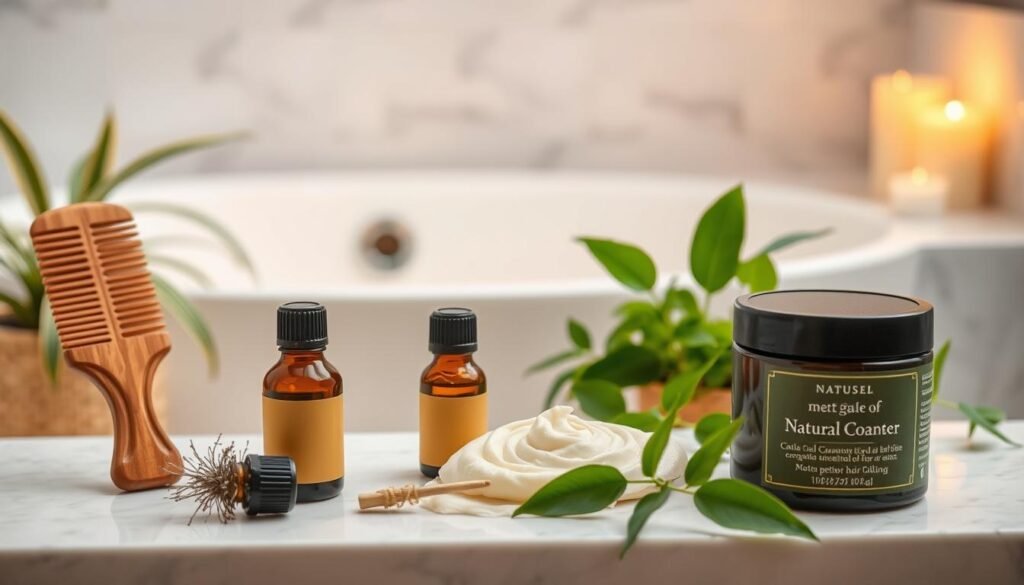About half of everyone worldwide deals with dandruff at some point. But that’s just one issue related to the health of your scalp, especially when it comes to an itchy scalp. Scalp irritation affects many, regardless of age or background. Knowing what causes an itchy scalp is the first step to fix it.
Things like seborrheic dermatitis, eczema, or head lice can make your scalp itch. These issues make people look for scalp itching remedies, either from store-bought products or natural solutions. In this article, we’re going to look at why scalps itch, find ways to soothe it, and give tips to keep it from happening again.
Key Takeaways
- Understanding the underlying causes of an itchy scalp can help in finding effective treatment.
- Common conditions include dandruff, seborrheic dermatitis, and atopic dermatitis.
- Over-the-counter medicated shampoos can offer relief for many scalp issues.
- Natural remedies may reduce inflammation and moisturize the scalp.
- Consulting a dermatologist is important for persistent or severe symptoms.
What is an Itchy Scalp?
An itchy scalp, or scalp pruritus, happens when your scalp gets irritated. This leads to discomfort and a need to scratch. Sometimes, you might feel itchy without seeing any signs, which makes it hard to know why.
Many things affect your scalp health, like pH balance, oil levels, and the environment around you. Your scalp has its own set of bacteria and fungi that keep it healthy. But when this balance is off, you might start feeling itchy.
It’s okay to have a little itchiness now and then. But if it’s happening a lot or really badly, you might need a doctor’s help.
If you’re looking for more info on itchy scalps, check out this link about scalp pruritus.
Common Symptoms of an Itchy Scalp
Having an itchy scalp affects up to 25% of people, studies show. Many complain about itching symptoms that disrupt their day. They might feel an ongoing itch, tightness, or a burning sensation. Some also feel a tingling that distracts them.
Signs of scalp irritation can appear as redness, dandruff, or sores. Even if you can’t see these signs, the discomfort can be big. People often mention pain when they touch their hair or scalp. It shows how important it is to know about itchy scalp symptoms.
Issues like seborrheic dermatitis, dandruff, and scalp psoriasis can cause these symptoms. Sometimes, for those with allergies or autoimmune issues, the symptoms get worse. It’s key to get medical help if home care doesn’t work.
Knowing these symptoms is the first step to fixing the problem. If the itching symptoms are strong or don’t go away, see a doctor. They can offer treatments that really help.
Itching Scalp: Causes and Conditions
An itchy scalp can be both annoying and uncomfortable. It’s crucial to know what causes it. Itchy scalp causes include dry skin and dandruff. These problems come from various factors that affect scalp health.
Dry Scalp
Dry scalp happens when your scalp doesn’t make enough oil. This might be due to washing too much or using strong shampoos. Cold weather and dry air can also make it worse. Using essential oils or hydrating shampoos can help add moisture back.
Dandruff
Dandruff is a big reason why scalps itch. It’s often caused by too much yeast on the scalp, which leads to flakes and itchiness. Keeping your scalp clean and using anti-dandruff shampoos can help keep it under control.
Seborrheic Dermatitis
Seborrheic dermatitis is a top cause of itchy scalp. It makes the scalp red and flaky, especially in oily areas. Treatments usually involve medicated shampoos and changes in how you care for your scalp to lessen symptoms.
Psoriasis
Scalp psoriasis causes quick skin cell shedding, making scaly patches. It can be itchy and uncomfortable. Treating it often needs special shampoos or even prescriptions to keep it in check.
Contact Dermatitis
Contact dermatitis happens when hair products cause an allergic reaction. This leads to scalp irritation, redness, and itchiness. Finding and stopping use of the products causing the reaction is key. Trying hypoallergenic or natural products can also improve scalp health.
| Condition | Symptoms | Common Treatments |
|---|---|---|
| Dry Scalp | Flaking, itching, tightness | Moisturizing shampoos, essential oils |
| Dandruff | Flakes, itching, redness | Anti-dandruff shampoos, lifestyle changes |
| Seborrheic Dermatitis | Red, greasy patches, flakes | Medicated shampoos, corticosteroids |
| Psoriasis | Scales, itching, red patches | Medicated shampoo, topical treatments |
| Contact Dermatitis | Itching, redness, irritation | Avoidance of triggers, soothing creams |
Reactions to Hair Products
Many people feel itching and irritation on their scalp because of hair products. Things like fragrances, preservatives, and harsh chemicals can cause these problems. A big concern is paraphenylenediamine (PPD). It’s in many hair dyes, especially dark ones. PPD can cause allergic reactions. Those who’ve had a black henna tattoo might react badly to hair dyes with PPD.
Reactions to hair products vary a lot. Some folks might feel a little itchy. Others might have serious allergic reactions, including anaphylaxis. If your scalp itches, it’s best to wash it well. Then, applying emollients or using steroid creams might help.
It’s important to figure out which products are causing problems. Shampoos often have allergens like fragrances and preservatives. Methylisothiazolinone and formaldehyde are common ones. Shampoo reactions might take one or two days to show. But, they can cause issues like redness, itching, or hives.
To lower the risk of reactions, it’s smart to do patch tests with new dyes or shampoos. If a product causes a reaction, stop using it right away. This helps avoid worse problems later on.
Itching Scalp Remedies
Finding the right way to ease an itchy scalp brings a lot of comfort. Many natural methods can help. Let’s explore some well-liked remedies:
Apple Cider Vinegar
Apple cider vinegar is a top pick for scalp care. It fights off fungus and bad bacteria. It helps keep your scalp’s pH balanced and gets rid of buildup. To use it, mix with water and apply to your scalp for the best results.
Coconut Oil
Coconut oil does wonders. It hydrates and fights off harmful bacteria and fungi. This makes it a key player in scalp health. Warm up some coconut oil and massage it into your scalp. This adds moisture, eases the itch, and helps hair grow healthy.
Peppermint Oil
Peppermint oil soothes and cools, easing irritation. Its cooling effects help with itchiness and boost scalp blood flow. Mix it with a carrier oil or your shampoo to get these benefits.
Colloidal Oatmeal
Colloidal oatmeal is a skin shield that holds in moisture. It’s especially good for dry scalps. Make a paste with colloidal oatmeal and water. Use it as a scalp mask to soothe irritation and improve skin health.
Scalp Care Tips for Relief
Itchy scalps are not fun and can distract you. To feel better, it’s key to take care of your scalp properly. Keeping your scalp clean is a big step. It stops irritation and supports a healthy scalp.
Choosing the Right Shampoo
Finding a shampoo that’s right for your scalp is important. Pick a sulfate-free shampoo to avoid making irritation worse. Shampoos with selenium sulfide, zinc pyrithione, or natural oils can help soothe your scalp. Here’s how to pick a good shampoo:
- Choose sulfate-free shampoos to prevent dryness.
- Look for shampoos with salicylic acid for scalp psoriasis.
- Try medicated shampoos with tea tree oil or ketoconazole for fungal issues.
Maintain Scalp Hygiene
Cleaning your scalp well is essential to lessen itchiness. Washing away product buildup and dirt is crucial. To keep your scalp clean, follow these tips:
- Shampoo often, depending on your hair type — curly hair weekly, straight hair daily.
- Make sure to rinse well after shampooing to get all the residue out.
- Steer clear of heavy styling products that can stick to your scalp.

By following these tips and choosing the right shampoo, you can improve your scalp’s health. Just a little effort can significantly reduce that annoying itch.
When to Seek Medical Attention
Knowing when to see a doctor for scalp problems is very important. If your scalp itches a lot, first try home remedies. But if it doesn’t get better, you might need to see a doctor. Symptoms like bad itching, a lot of redness, or pain mean you need expert help.
If you have scalp psoriasis or bad dandruff, you might need strong medicine. Watch out for these signs:
- A rash that doesn’t improve over time
- Fever or feeling unwell
- Severe itching affecting your sleep
- Bleeding or pus from any rash
- New severe itching during pregnancy
Doctors might ask for blood or urine tests to find out why your scalp itches. Getting help early can stop worse problems, like infections or lasting skin damage.
| Symptoms | When to See a Doctor |
|---|---|
| Persistent Itching | Yes |
| Rashes or Sores | Yes |
| Severe Redness | Yes |
| Slight Discomfort | No |
| Dry Scalp | Maybe |
Spotting these warning signs means you should see a doctor soon. Talk to a healthcare provider about your worries. They can help you feel better and get your scalp healthy again.
Preventing Itchy Scalp in the Future
To avoid an itchy scalp, start by eating right. A diet full of omega-3 fatty acids, protein, and antioxidants helps your scalp stay healthy. These nutrients are vital. They help fight off conditions like psoriasis and seborrheic dermatitis. Scalp psoriasis affects about half of the people with psoriasis, making good care essential.
It’s key to pick the right hair care products. Stay away from stuff like ethanol, parabens, and strong fragrances. They can upset your scalp. Using medicated shampoos can help with dandruff and scalp psoriasis. Adding tea tree oil is a plus. It fights fungus and reduces swelling.
Protect your head from the sun and elements. Wear hats to prevent dryness and inflammation. Drink plenty of water to keep your scalp moist and happy.
Know what makes your scalp itch. Tracking your reactions might show which foods or products are bad for you. Use hypoallergenic products to lower the chance of allergic reactions.

Clean your place regularly to lessen dust and mold. These allergens can make your scalp itch. By doing these things, you can look after your scalp’s health and avoid discomfort.
Conclusion
An itchy scalp can be a tough challenge, but knowing why it happens is key. Dandruff, eczema, and psoriasis are common culprits. Learning about these can help you tackle the itchiness. Taking care of your scalp naturally can also make it healthier.
Being proactive is the way to go for scalp care. Choose the right products and keep up with your cleanliness. Sometimes, nature’s remedies are the best solutions. If the itch won’t go away, seeing a professional is a smart move. This ensures bigger issues aren’t missed. Taking care of your scalp means better hair and less trouble.
In conclusion, taking care of your scalp in all ways is crucial. Mixing treatments, changing your lifestyle, and using natural solutions can change your scalp for the better. This approach can lead to a future where scalp itch is a thing of the past.